#i think now. that fourteen's ending is in almost direct conversation with his arc
Text
i am rly rly feeling like this over twelve
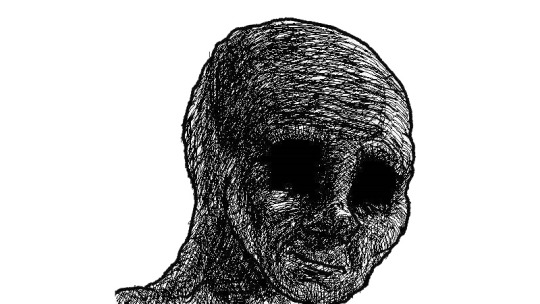
#for MANY reasons#dr who#i think now. that fourteen's ending is in almost direct conversation with his arc#rtd looked at him (and eleven and thirteen) and went damn they all deserve better. And he was right lol#12 era
50 notes
·
View notes
Text
thots on little women (2019)
or, y’all are giving greta gerwig too much credit, part one
(Before y’all say anything, I know)
I have a lot of thoughts about the new Little Women movie.
I should probably start by saying that I loved the new movie. I thought most of the acting performances were good (Emma Watson’s accent notwithstanding), and it was a pretty faithful adaptation of the book; a lot of the quotes were lifted verbatim from the novel, and I often found myself mouthing along with the actors. I don’t usually like book-to-screen adaptation changes, but I actually didn’t mind most of the changes here. The two biggest things that were changed were the decision to start the story in the middle and jump back and forth, and the positioning Jo as the writer of Little Women who was forced to write in the “Jo marries Bhaer and gets a happy (married) ending” bit. I actually really liked both of those choices and thought they were good additions to the story, making this probably the only time I’ve ever liked any book-to-screen adaptation changes. Also, I am and have been since childhood an Amy March stan, and I liked that her character was more fleshed out and relatable to other viewers. I also think Florence Pugh did a superb acting job. Overall I liked it a lot, and I fully intend on rewatching it again.
I should also say that I read Little Women when I was very young, probably nine or ten, and I loved it, and it has been one of my favorite books since. Regardless of these facts, I never saw any of the live action versions, so the only version I have to compare the 2019 one with is the movie inside my head. With that said, as previously mentioned, I have a lot of thoughts.
Look, the movie was really good. I thought so, my family thought so, and clearly critics thought so too. But when I started reading the reviews after I had seen the movie, something about them kept rubbing me the wrong way. Something kept nagging at me, but it wasn’t until I read this particular review that I realized what it was: “here’s the thing about greta gerwig’s little women. it’s really not just about jo anymore...she showed the struggle and sacrifice and love that meg has. she gives beth one of the most beautiful story arcs ever. she lets beth exist in the movie and grow on us before her death.” But… she didn’t, I remember thinking. And that is the crux of my issue with the movie, or at least, the conversation around the movie. It feels like a lot of people are giving Gerwig credit for things she didn’t actually do, like fully fleshing out the non-Jo characters, or exploring Jo’s sexuality. And that is what I am going to discuss in this essay.
I imagine the Venn Diagram of people who read my first Descendants meta and people who will be interested in this is virtually nonexistent (probably just me, honestly) but just in case, this essay will be set up similarly to my last one. It will probably come in at least two parts, since I can already feel this getting away from me, and I will start with an unnecessarily long list of prefaces:
This meta is not, for the most part, about race. I do believe Greta Gerwig is a White Feminist™, which shows up in a lot of her work, up to and including this one. Obviously the racial diversity of Little Women is virtually nonexistent, but coming from a Greta Gerwig adaptation of Little Women, I’m not sure what y’all were expecting. Since I didn’t go into the movie anticipating any sort of racial diversity, I wasn’t disappointed, and for that reason I will be leaving racial dynamics and Gerwig’s fraught history with racial diversity out of this meta almost entirely.
As previously mentioned, I read Little Women when I was pretty young and loved it. I read it way before I knew anything about the internet or media discussion, so I formed my opinions on the story writ large independently of basically everyone else. With that said, it wasn’t until way later, like about 14 or 15, that I actually started reading online discourse about Little Women and discovered that my opinions ran contrary to just about everyone else’s.
For example, I have always loved Amy March. She was always my favorite character, her chapters of the book were always my favorite to reread, and I was ecstatic when she married Laurie and thought it made perfect sense.
Conversely, I have never been a huge fan of Jo. I know, in the book community that’s basically blasphemy, but whatever. This sense of apathy is probably due to the fact that Jo and I have virtually the same personality, and I get on my own nerves quite often, and also that even as a child I was never a huge fan of Jo’s “not like other girls” personality.
I am what some people would call hyper-romantic. Consequently, my favorite section of the book has always been the last half, with all of the romances and drama. I also didn’t have a huge problem with Jo’s marriage to Bhaer; I didn’t love it or anything, but given that I was never super attached to Jo’s character, I wasn’t super broken up when she married him, also partly because…
I never read Jo as queer. I know, I know, but as a bi woman, I never picked up on whatever subtext everybody else seemed to. I grew up around a lot of white women in the country, and they all acted exactly like Jo did, so maybe that’s why. Of course, it’s a perfectly valid interpretation/headcanon, I’m just telling y’all that I personally never saw it. With that said, I was excited to watch an interpretation where she was more explicitly queer, as all the reviews seemed to say she was, and boy, was I… disappointed.
To clarify, I’m not saying all of my opinions because I want to change anyone’s mind, or convince them that they’ve been reading the book wrong all these years. But I think it’s important to let y’all know where I’m coming from, since I’m sure it’s going to color the way that I view the movie, and the problems within it. In the same way, if my personal opinions about the book change the way you are going to read this essay, I suggest stopping now.
With all that said, I present: Thoughts on Little Women (2019). Also, spoilers, obviously.
Part One: The Sisters
A lot of the praise given to Gerwig’s Little Women centers around one thing: Jo’s sisters. Specifically, how the three sisters are given a much more prominent role in the storyline than in previous adaptations, almost to the level of Jo herself. Now, as previously mentioned, I have never seen another adaptation of Little Women, but I can speak for this adaptation and say that I feel supremely let down.
Let’s start with the obvious: Beth. The review that I cited claimed that Gerwig “gave Beth one of the most beautiful story arcs ever” and “let viewers get to know her so that you really feel her loss.” While of course this reviewer is entitled to their opinion on this movie; all media is up for interpretation, I can’t say that I agree with these statements, or even know where this interpretation came from.
Beth basically only has five major scenes in the film. Obviously she’s a part of many of the other girls’ scenes, but when I’m discussing her “major” scenes, I’m referring to ones where the main focus of the directing is on Beth and her feelings/behaviors. Anyone who read Little Women can tell you that the most memorable thing about Beth is her death. Unfortunately, in the movie, the scenes that deal with her sickness/death are more focused on Jo’s feelings than Beth’s. In the past, Jo mourns her hair with more concern than she shows for Beth, and in the present, the focus continues to be more on Jo’s emotions. Beth’s only actual major scenes are:
Beth is too nervous to talk to Mr. Laurence and hides behind Marmee
Beth is the only one of the March sisters to go visit and take care of the Hummels; she contracts scarlet fever
Beth overcomes her fear of Mr. Laurence and goes to play the piano in his house.
Mr. Laurence gifts Beth a beautiful grand piano; she goes to thank him.
Jo takes Beth to the beach where Beth confesses she is ready to die.
The problem with these scenes is that they tell us basically nothing about Beth’s characteristics. From those five scenes, we can glean that she is selfless, shy, until she isn’t anymore, and that she is a musician, which, contrary to what many musicians believe, is not a personality trait. In actuality, we cannot even concretely say that she is shy, since we only see this behavior through her interactions with Mr. Laurence. She seems to have no problem engaging with the Hummels, and it could just as well be that she is more nervous interacting with a rich older unmarried man, which would not be uncommon for a woman of her situation in her time period.
The only personality trait that differentiates Beth from her sisters is her selflessness, since all three of the other sisters have moments of selfishness that define their characters. But the only time this is ever contrasted with them is when she goes to visit the Hummels, (and then she contracts scarlet fever as a punishment?) One occurrence does not a personality trait make. We know virtually nothing about who Beth is. When viewers see Beth’s sickness and eventual death, they feel sympathy for Jo instead of mourning Beth’s character.
In fairness to Gerwig, much of this is the result of the source material instead of a directing choice. Beth was never given as much focus on Alcott’s Little Women as her sisters. For context, each of the sisters were given “chapters” that focused on their adventures and exploits. Meg has eight, Jo has fourteen, and Amy has ten. Beth has a grand total of five chapters actually centered around her point of view. So it seems obvious that in an adaptation of the source material, Beth would not have been given nearly as much precedence in the narrative.
BUT, and this is a huge but, we knew that Gerwig has no problem changing huge parts of the story she’s telling. This is not a bad thing; as I’ve already mentioned, I think it works to her advantage in many parts of this movie, namely the ending change. So it would not have been out of her scope of abilities or desires to change parts of the source material to flesh out Beth’s character in the same way she fleshed out Jo’s. The fact that she elected not to do that shows that she simply didn’t want to.
Again, this is not a bad thing. Even though it is always presented as a story of four sisters, it is no secret that Jo is the main character of both the book and basically every adaptation. It is no surprise that she is the most developed character because she is essentially the protagonist.
HOWEVER, with all of that knowledge, the thing that irks me about this movie is how the conversations around it has been giving Gerwig so much credit for how developed all of the sisters are when this just isn't true. As it turns out, it is untrue across the cases of all of the sisters.
The next most obvious is Meg. Meg’s case is arguably more egregious than Beth’s, because arc-wise, she is the one who lost the most in the book to screen adaptation. As before, let’s take a look at Meg’s major scenes:
Meg is invited to spend several weeks with her rich friends and she allows them to parade her around and turn her into someone she’s not (even if she wants to be.)
After Laurie sees her in at the party with her friends he judges her, then apologizes, and then they dance and he treats her like a lady.
When the sisters go with Laurie and company to the beach, John Brooke flirts with her, which she reciprocates.
Later on, John volunteers to go with Marmee to take care of Mr. March, and Meg kisses him on the cheek.
Before her wedding to John, Jo asks Meg to run away with her, and Meg responds that “Just because my dreams aren’t as big as yours doesn’t mean they aren’t important.”
Meg’s rich friend Sally convinces her to buy a length of expensive silk to have a dress made.
After purchasing the silk, we see Meg regretful outside her home, and she hugs her twin children.
Meg and John have a conversation about the silk, in which she tells him that she “is so tired of being poor.” When John looks hurt, she apologizes.
John comes to the March household to tell Meg that she should have her dress made. She tells him that she’s already sold it to Sally, and they make up.
Meg definitely has more focused scenes in this movie than Beth does, which makes sense, as she is clearly a more prominent character than Beth is. In the book, Meg has a total of eight focused chapters, to Beth’s five. However, proportionately, the ratio of Meg’s focused scenes to Beth’s is considerably less than the ratio of Meg’s focused chapter’s to Beth’s. This is because for whatever reason, many of the scenes that dealt heavily with Meg’s character, particularly in the second half of the book, were done away with in the movie. Meg’s lifelong dream in both the novel and the movie was to be a wife and mother, and she has an entire arc in the book that centers around that. In the movie, however, it was entirely cut out.
Look. I’m not here to pass judgements on the merits of Meg’s lifelong goal from a feminist perspective. Meg is allowed to have her dream just as Jo is. In the movie, Meg has a wonderful line right before her wedding, when Jo suggests that they run away together. “Just because my dreams are different than yours doesn’t mean they’re less important.” This is a lovely, sentimental, and even feminist take on Meg’s hopes. Desiring to be mother to a man and mother to children is not necessarily a feminist dream, but she is entitled to it just the same. Following that same logic, if you are going to go out of your way to include a line about how Meg and Jo’s dreams are equally important, they should be treated so in the narrative. At the bare minimum, Meg’s arc should be on par with the source material, but it simply isn’t.
In the second half of Little Women, Meg has several focused chapters where she learns to manage a household, comes to terms with being the wife of a poor man, and how to balance having children with having a husband. She has several important discussions with Marmee and with John that are entirely cut from the movie, and we only see her children, Daisy and Demi, twice.
To reiterate, none of this is bad filmmaking, per se. If Greta Gerwig set out to make an adaptation of Little Women that is more focused on centering Jo as the protagonist than the novel, that is perfectly fine. The problem is that Gerwig seems to think she made a more balanced adaptation than the source material, and so does everybody else.
#raetalks#little women#little women (2019)#greta gerwig#meta#saorise ronan#timothee chalamet#emma watson#florence pugh#jo march#amy march#beth march#meg march#eliza scanlen
39 notes
·
View notes
Text
Miles Morales: Ultimate Spider-Man (2014-2015) - Not with a Bang, but a whimper
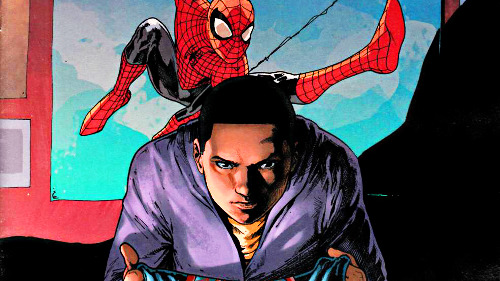
Post Ultimate Comics Spider-Man #19, Miles Morales’ written career as Spider-Man has not been great. After fridging one of the only central supporting female characters in his cast – Rio Morales, his mother – the state of the narrative became preoccupied with manpain, and framing the grief of a teenage boy as, in the words of Miles Morales, someone who “didn’t understand what it meant to be Spider-Man” (Ultimate Cataclysm: Spider-Man #1), which required his entire supporting cast to shame and emotionally manipulate him back into the job.
If there was any good that came out of the last five issues of UCSM, it was probably the introduction of Ultimate Cloak and Dagger and Ultimate Taskmaster.
Miles Morales: The Ultimate Spider-Man, unfortunately, offers very little in the way content improvement outside of one side story and its art direction. Otherwise, it doubles back in circles on subjects and issues that should’ve been laid to rest and ends on an inconclusive whimper.
Ultimate Spider-Man #200 + #Issues #1-7
Death in comic books means nothing, and holds no weight unless you’re a wildly unpopular (or non-white) character that any given publication is looking to get rid of in order to appease their narrow minded (and white) audience. When the Ultimate Marvel universe was created, one of the creeds it presumably lived by was that “death mattered”. When a character died, it would mean something, it would impact the narrative, and every character that died would remain dead.
It’s a shame, then, when they chose to stick their guns, they let Jeph Loeb decimate almost half of the Ultimate Universe’s roster in one of the uglier displays of wanton violence, sexism, and just plain shit writing, with the 2011 “Blockbuster Event” Ultimatum. Ultimatum more or less ensured, despite maintaining the promise that no one would return from the dead, none of the deaths mattered – a lot of it was just Loeb masturbating to his own cruelty if we’re being honest.
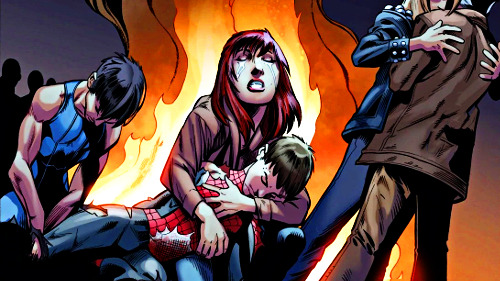
With the “Death of Spider-Man”, Brian Michael Bendis added salt to an otherwise unhealed wound that was Ultimatum, which wasn’t even a year old at that point. To his credit, he made Peter Parker’s death matter – book ending it with the first villain that more or less was responsible for the creation of Spider-Man (Norman Osborn) – with reverberating consequences throughout most surviving series in the UM. Yet, following the introduction of Miles Morales – the new and Black Spider-Man (reportedly meant to honor Bendis’ Black children, whom I pity) – you could tell, in the years preceding the removal of Peter Parker as the protagonist of the Spider-Man title, Bendis was regretting his decision.
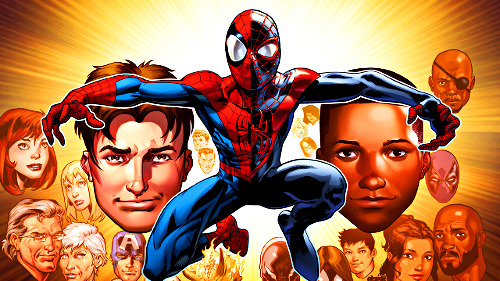
After a 160 issue run (where Peter made actual appearances and was the protagonist until his death), the questionably numbered Ultimate Spider-Man #200, once again sees Bendis fantasizing about what he might’ve done had he not killed Peter Parker and replaced him with Miles Morales. Most of the original cast of characters that were central to Peter Parker’s story – plus Miles and Ganke – gather together at the Parker House at the behest of May Parker and Gwen Stacy (who appears to be a creep perving on underage teen boys no matter what), to commemorate the life of the late Peter Parker. Considering the previous three iterations of “Memorializing Peter Parker” in the UM, Ultimate Spider-Man #200 brings nothing new to the table, but should’ve been a red flag to anyone paying attention to the declining quality of Miles’ title.
Miles’ final title in the Ultimate Universe, Miles Morales: The Ultimate Spider-Man, begins with the reintroduction of a supposed-to-be-dead Norman Osborn – in the custody of S.H.I.E.L.D. – and two generic Spider-Man copycats robbing banks. There’s nothing really of note to say about the first seven issues of this thirteen issue title. Bendis decides, with the Ultimate Marvel universe doing the death rattle, to undo the death of both Osborn and Peter Parker – with Peter getting a half-assed excuse for his being brought back from the dead (to sum it up: “because reasons”).
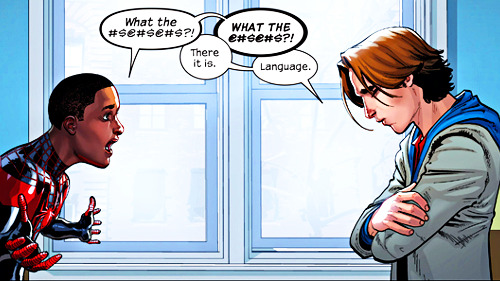
I don’t think a Spider-Man comic has made me quite as angry as this series has. In the moment I read the issue wherein Peter Parker tells Miles, “It’s time for the Original Spider-Man to get back into the game”, I could’ve torn the book into shreds and smote its ruins if I thought it was going to hurt Marvel’s sales and not be an even greater waste of my spent $3.99.
“I can’t believe we’re beating this dead horse again” was what I was thinking and I just stopped buying the book altogether. I think that the first step to mine ceasing to see Miles Morales as a legitimate character, but wasted potential in the hands of non-Black creatives. I only ended up reading the trades for the sake of reference and fact checking and it’s only this year, three-four years after the fact that I bothered to do that. The only thing worth noting about the first seven issues of this title is that it sets up the last four, which are even worse.
Cataclysm: Ultimate Spider-Man #1-3 + Issues #8-9
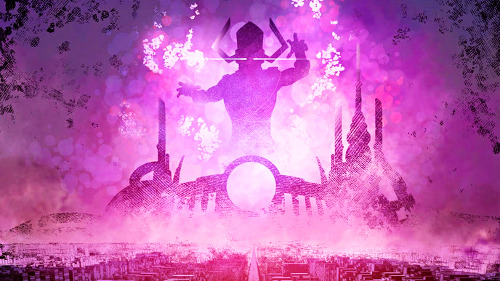
Cataclysm: Ultimate Spider-Man is one of seven miniseries titles part of the “Blockbuster Event” known as Cataclysm, which sees Ultimate Galactus (or 616 Galactus, I’m not sure which tbh. There’s very little difference between the two when you get to the nitty-gritty) attempting to destroy the 1610 universe and devour it all. You get the distinct feeling that, before someone came up with Secret Wars, Cataclysm was meant to be the true end of the Ultimate Universe – but someone upstairs changed their mind and rendered it to a mere false start. Long story short: The grand majority – if not all of – the Ultimates (the Avengers of the 1610 universe) are killed or sent into the void with Galactus by Ultimate Shadowcat – who is later hailed savior of the world. The All-New Ultimates are formed.
Das it.
But, within Miles’ slice of the Cataclysm story, Bendis finally decides to focus on the elephant in the room: Jefferson Davis and his open and his fantasy xenophobia toward superhumans and how it has literally silenced his own son from admitting to his double life as Spider-Man. Moreso since the death of his mother, Rio Morales, at the hands of Ultimate Venom. I’ll be perfectly honest – I don’t think Jefferson Davis is a great guy – I actually ended up liking his no-account brother (Aaron Davis, gone too soon) far more because he was upfront about his ideals and his mission statement. He never pretended or tried to be a better person. He was just rotten and enjoyed it.
For that one piece of sage advice Jefferson offered Miles in the earliest tenure of his first title, Jefferson is the perfect example of a man who expects his son to “do as he says, and as I do”, but expects no consequences visited upon him whenever he dehumanizes people. He’s a walking metaphor for the heterosexual Black father who spews homophobic slurs in casual conversation around their gay daughter or son and I’m sure as hell that was intentional despite the incompatibility of the allegory.
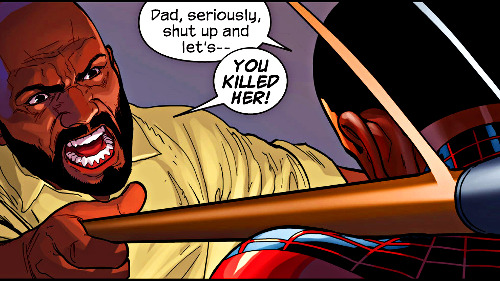
Cataclysm: Ultimate Spider-Man doesn’t do much to repair his character, if anything it makes him thrice times worse. When Galactus starts wrecking all of New York City and Brooklyn, Miles, Bombshell (Lana Baumgartner) and Cloak and Dagger, struggle to save the people caught in the monster’s wake – all while recounting where they were when the Ultimatum event occurred.
In Miles’ flashback, we see Jefferson lose his head over the knowledge that the title wave was caused by a mutant (Magneto), all while loudly proclaiming everyone stuck in traffic was going to die. The most important nugget of information taken away from Miles’ flashback is the knowledge that his father more or less promised that he would abandon or disown Miles if he ever found out his son (then, probably only 11 or 12 years old at the time) was a superhuman.
I never had much sympathy for Davis (I tolerated him because of Rio), but the moment Miles tries to convince his father to come with him out of the city to safety, and Jefferson decides to blame a now fourteen year old Miles for the death of Rio and Aaron, I just outright hated him. Cataclysm: Ultimate Spider-Man is not a bad read all things considered. It tells its story concisely and never loses focus of its characters in relation to the catastrophe. The downside is that you have to read the rest of the Cataclysm series to know what was going on. I’d probably recommend you read it, especially since it ties into two issues of The Ultimate Spider-Man.
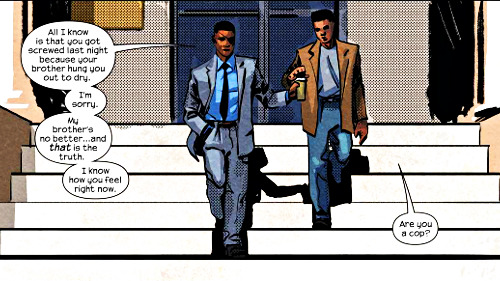
The conflict between Miles and Jefferson is left hanging until issues #8 and #9 of Miles Morales: The Ultimate Spider-Man – also known as “The Only Redeeming Thing About This Comic Book Title”. The eighth and ninth issues of MMTUSM sees Jefferson Davis finally owning up to his past and basically just spilling the beans about his life as a criminal with Aaron and how he became involved with S.H.I.E.L.D. during the 80s – when Miami Vice, Jerri Curls, House Party Flattops, and ill-fitting suits with shoulder pads were all the rage – and how he met a young, already-at-it, Nick Fury.
The complete tonal and visual shift in the issues are a welcome respite from the Peter Parker nonsense of the previous seven. The story arc, “Miles Morales: An Agent of S.H.I.E.L.D.?”, carries with it the kind’ve of visual flair I see a Tim Sale illustrated graphic novel (like Spider-Man: Blue or The Long Halloween), but it’s still David Marquez illustrating the story from beginning to end.
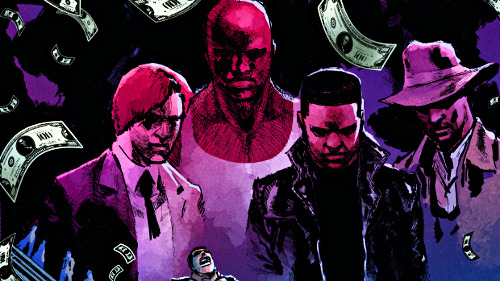
It’s got the look and feel of a pulp novel, or one of those old newspaper comic strips where the spots of the print were obvious through the inking and character sketches. The narrative, which sees Jefferson and Aaron working for smalltime criminals to Jefferson’s eventual graduation to protecting the Kingpin (with a minor explanation as to why he loathes mutants), is, in my opinion, the highlight of a story that could’ve worked as a full-fledged miniseries about the Jefferson brothers.
My only quibble with the framing of the narrative is that the early inclusion of S.H.I.E.L.D makes Jefferson look more like the unwilling participant of crime he was manipulated into thinking he had to do for “the greater good”, as opposed to some young blood who didn’t give much thought to right or wrong (which is how the early issues framed it) before he had an epiphany. I always assumed the crime came first, then S.H.I.E.L.D, then Rio. Honestly, if you’re at all interested in this storyline, just look for the single issues and don’t buy the trade. You’ll be doing yourself a favor.
#Issues 10-13
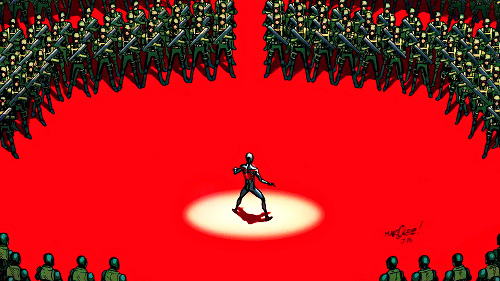
Marvel and its twisted, present-day romantic relationship with Neo-Nazism is a fairly ironic one, given most of its early artists were white Jewish dudes with alternate names designed to explicitly hide their Jewishness on account of antisemitism. But, I suppose the publications preoccupation with Nazism to begin with (even if it was denouncing it) would’ve inevitably steered its future publishers to romanticize it in the end. I mean, that’s what happened after all.
You know shit it bad when Marvel wants you to pity [white] characters like Grant Ward of Agents of S.H.I.E.L.D for joining a Neo-Nazi group, despite the repeated and angry affirmations of protagonist Daisy Johnson, who flat-out reminds the audience, “You are a Nazi if you join Hydra”, who is undermined anyway by the narrative that continues to bleat, “pity the Neo-Nazi.”
Brian Michael Bendis, in all his infinite lack of wisdom, decides – the biggest way to differ Miles Morales’ love life from Peter Parker’s, is make an underdeveloped character, his girlfriend, Ultimate Kate Bishop, a member of Hydra. Miles’ white girlfriend rides on the agenda of the Aryan Ideal and white supremacy. Brilliant.
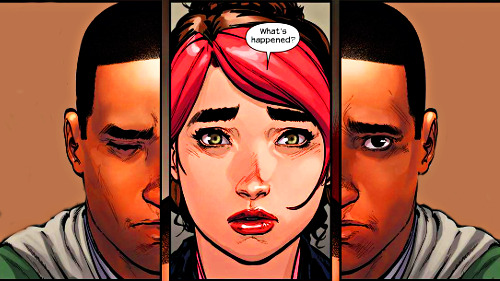
The Ultimate Spider-Man issues, #1-#4 and #7 prelude the last four issues with Miles deliberating whether or not he should tell Katie Bishop about his double life as Spider-Man. Instead of being supportive, everyone from Ganke to Cloak and Dagger warns Miles against telling her, thinking it would be a bad idea. He does it anyway, Katie panics and runs away.
The aforementioned issues give the reader a glimpse into Kate’s life with the Bishops, with one conversation with her older sister casually mentioning that “they” would have to kill Miles and the seventh issue concludes with her uttering the phrase, “Hail Hydra.”
If The Ultimate Spider-Man had something to say about the issue of Nazism, especially in relation to Miles’ life as a Black teen – or the cautionary tale of “you never know someone until…”, then I could maybe understand the decision to make Kate Bishop (a wildly popular Avenger in the 616 universe, be she an adult or a teenager) a Nazi.
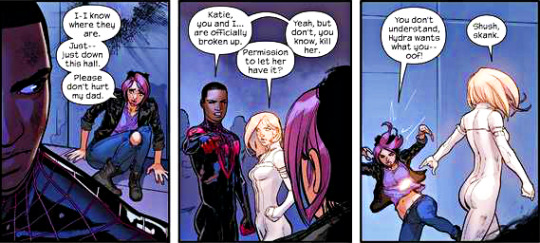
But, it doesn’t, it basically does exactly the same thing Agents of S.H.I.E.L.D does with the Daisy Johnson/Grant Ward dynamic. The narrative depicts a “Sympathetic Nazi” (Katie) trying to explain their position, and a furious significant other (Miles) outright declaring their relationship is over. Only, where AOS more or less dragged that subplot out to its natural conclusion (“Sympathetic Nazi” isn’t really sympathetic and dies),
The Ultimate Spider-Man did nothing to that extent. Readers barely have gotten to known Katie Bishop since her introduction in issue #23 of UCSM. She was given no time actually to be anything other than “Miles Morales’ girlfriend”. And when it comes right down to it, the Hydra subplot was nothing but an excuse to bring Dr. Doom into the narrative at the last moment. So, the “My Girlfriend is a Nazi” storyline just falls flat.
On a smaller note, the way the last couple issues decide to use Judge – the minor character from Ultimate Comics Spider-Man – is sigh inducing. It’s like Bendis realized his book was coming to an end and figured the best way to a handle a character that barely had any face time since the first twelve issues of the UCSM, is to just plop him in the middle of the story with his already knowing Miles is Spider-Man.
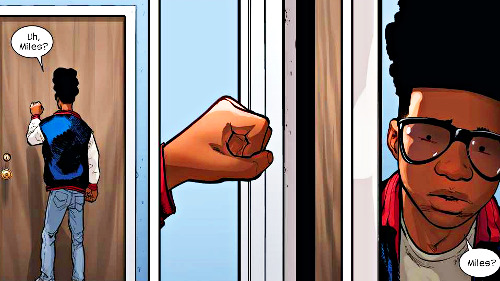
But, he does it in a way that, if you removed him from the story, nothing would change. It’s a superfluous addition and kind’ve discourteous, especially since Bendis doesn’t do anything with Judge later on in Miles’ new 616 title, the unfortunately named Spider-Man.
Outside of issues #8 and #9, Miles Morales: The Ultimate Spider-Man is a sad conclusion to Miles Ultimate Universe solo-title career. It reminded me why I stopped reading his title four years ago, and knowing that none of his recent stuff isn’t any good either kinda makes me glad I made the decision so early on.
#miles morales#spider man#katie bishop#brian michael bendis#david marquez#ultimate miles meta#1610 miles morales#1610 judge#1610 kate bishop#1610 jefferson davis#media: long posts
9 notes
·
View notes
Text
Episode 33: Fortress vs. Fortress

Love Triangles

“Yang told me not to write the real names even in my diary, so I’ll use pseudonyms, but non-commissioned officer A and non-commissioned officer B had been fighting forever over the civilian Miss C, and that fight was revived on Iserlohn, but Miss C, who hated Officer B, impulsively shot him to death.”
—Julian’s Iserlohn Diary, p. 61-62
(From episode 30.)
Honestly, the love triangle between Officer A, Officer B, and Miss C that Julian describes in his diary sounds like one of the more straightforward and classic love triangles in the LoGH world. LoGH love triangles, as we’ve discussed, tend to be rather twisted, tragic, or otherwise subversive. These triangles don’t present an either/or choice between two romantic rivals standing on equal ground, where the choice hinges on the interior romantic feelings of the character at the vertex; rather, most love triangles in LoGH are narrative tools to highlight the ways social structures shape our choices for us, or to add depth to characterizations by showing the ways that people approach these choices differently.
On the Alliance side, the love triangle of season one was between Yang, Lapp, and Jessica, with Jessica at the vertex. And the way it played out set up open questions about Yang’s wistful passivity and reluctance to pursue a romantic relationship with Jessica both back in college and now, despite her professed interest. Many factors were at play in that dynamic: Yang may have believed that Jessica was more interested in Lapp, or been reluctant to compete with his friend; and in the present day, tensions over their past, Lapp’s death, and the war complicated any possible relationship between them. But as Jessica tells it in episode 10, she was disappointed that he didn’t continue to express interest after that first awkward dance; and despite that confession and an almost-kiss, Yang’s reluctance remained a constant, as he made no further move to pursue her.
In season two, Yang is involved in another love triangle of sorts, and this time he is at the vertex.

The line in Japanese is Teitoku wa itsu ni nattara hakkiri saserun darou? which translates literally as “when will the admiral make it clear?” The official subs translate it as “when will the admiral just tell her?” which is misleading: It implies Julian has a belief that Yang reciprocates Frederica’s feelings, but both before and after this Julian professes not to know Yang’s feelings.
This triangle between Yang, Frederica, and Julian currently exists only inside Julian’s head. But for Julian at this point in his life it is very real and looms very large—dominating his thoughts, as we see in the moment above, even as he rushes into battle against a giant fortress that just warped into the corridor and attacked them. And since it’s foundational to the emotional arc of the whole rest of the show, it’s worth taking time to examine in painstaking detail exactly how it’s set up early in this season.
The Julian/Yang/Frederica Triangle
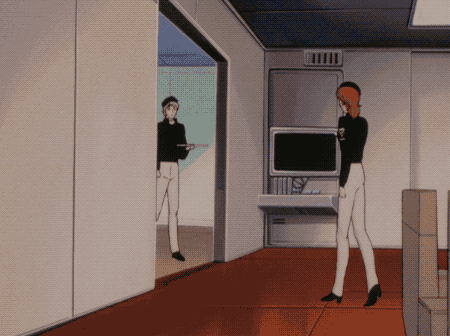
(From episode 24.)
The last time I talked about Julian’s feelings for Yang I speculated that, despite seeming to have all the major symptoms of a crush, he probably didn’t frame it to himself that way (although we had no way to know for sure). But that was almost a year ago—in story time, that is—and a year is a long time when you’re fifteen-going-on-sixteen. And uh, I’m gonna go out on a limb and say that he’s figured some stuff out.
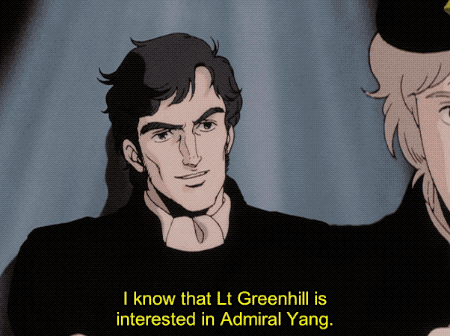
Have I fangirled about Nozomu Sasaki’s voice acting yet? Well it’s about time I did—the subtitles can’t do this exchange justice, so please go watch it (12:17) right now to appreciate the soft edge behind his “saa” here. Damn.
(From episode 30.)
This is one of those times when I’m not sure what my job here is supposed to be: Schenkopp asks whether Yang is interested in Frederica and Julian’s reaction is to say “how should I know” then lower his eyebrows angrily and shoot the target directly in the heart. Tell us how you really feel, Julian.
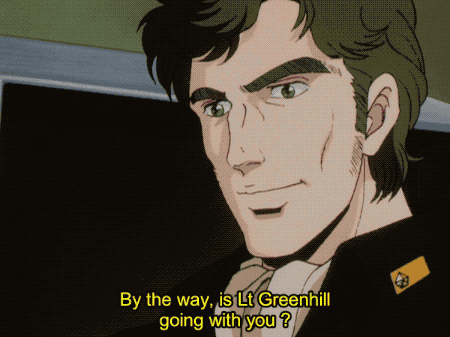
Ding ding ding, yes, how he really feels is jealous. Well done Schenkopp. This is the line right before we jump to Schenkopp interrogating Julian on the shooting range, and already here a triangle of some sort is suggested, with Julian and Frederica paralleled to each other as rivals for Yang’s attention. So how is Yang processing this line? How is Cazellnu? We’ll come back to both of those questions in the future!
(From episode 30.)
In episode 33 we get another peek inside Julian’s mind, as checking in on the Cazellnu ladies prompts him to recall a recent conversation with Yang.
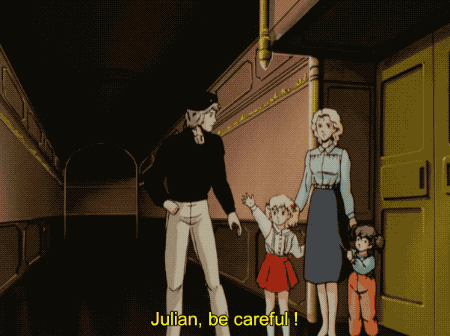
Have I mentioned Cazellnu has issues? Seriously dude, pressuring your 30-year-old friend about his love life is one thing; telling a teenager you intend for him to marry your eight-year-old daughter someday is a whole ’nother level. Leave Charlotte and Julian alone dammit.
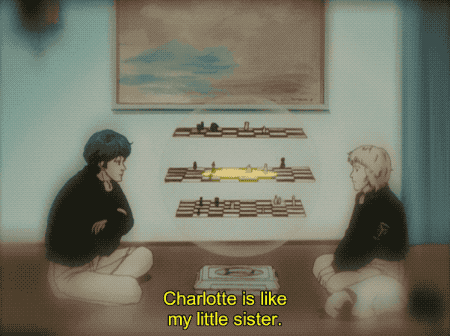
Yang is totally oblivious here to how his “eh she might seem like a little kid to you now but things change” take might interact with Julian’s own complicated emotions...
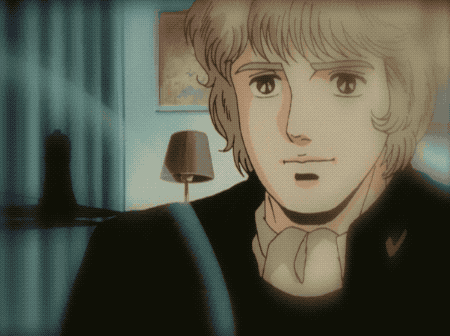
...and it makes sense to me that Julian immediately fires back by probing Yang’s feelings for the only obvious potential romantic partner currently in his life.
Julian’s emotional life revolves entirely around Yang. That’s been true since we first met him, and when he was fourteen or fifteen it manifested as relatively uncomplicated hero worship/puppy love, a desire both to be as much like Yang as possible and to do as much as possible to look after him and be useful to him. But that dynamic isn’t sustainable as Julian grows up. And what these two scenes tell us is that a thread of tension now runs through Julian’s emotions, specifically about the development of Yang’s love life. Everything about the narrative framing in these scenes sets up a classic love triangle: Schenkopp’s insinuations about Julian being jealous of Frederica segueing directly into Julian acting angsty about not knowing whether Yang reciprocates Frederica’s feelings; Julian’s thoughts jumping from remembering Cazellnu’s matchmaking schemes between him and Charlotte to solemnly wondering when Yang will make his feelings about Frederica more clear.
...But this is LoGH. And zooming out from the narrative framing to the broader context, to say this particular triangle is “not that simple” would be a drastic understatement. Julian and Frederica are not on equal ground here; while Frederica seems perfectly constructed as a potential romantic partner for Yang, every possible situational variable is aligned against Julian. When Julian thinks about Yang “making things clear” or “making up his mind,” the two options on the table are “yes Frederica” or “no Frederica.” Julian simply isn’t an option. Heteronormativity is one factor in that, sure, but not the most important one—the age difference and power dynamic mean not only that Julian is a socially unacceptable love interest for Yang, but that in fact any expression of romantic interest from Yang’s end would be deeply, deeply inappropriate. And Julian must know that. However…

Is it too disturbing to say that what this line reminds me most of is a dog marking its territory? Anyway, it’s the addition of “favorite” that really gives it that possessive feel; he could have just said he has to go make Yang dinner, but instead he feels the need to emphasize that he is the one who knows how to cook food just the way Yang likes it.
(From episode 30.)
Frederica isn’t a threat to Julian’s role as Yang’s intellectual disciple, or to his role as Yang’s physical protector. But she is a threat to his role as Yang’s caretaker and domestic partner, and it’s no coincidence that he ends the conversation with Schenkopp by emphasizing that position. Sure there’s nothing romantic about their relationship right now, but the status quo is still that Julian is the person closest to Yang, the person who lives with him and looks after him and cooks for him and spends cozy evenings beating him at 3D chess. The two sides of the triangle may be “Frederica” and “not Frederica,” but the closest Julian can hope to come to actually being chosen is for Yang to never choose anybody, for the status quo to just quietly continue.
On Surface Readings
A lot of the storytelling in LoGH has the feeling of a magic trick: It tells one story if you look at it through glasses that assume romantic attraction can only occur between men and women, and completely different stories if you remove that lens. The key to this trickery is that it’s simultaneously true that there exist non-queer interpretations of the things we see, and that if you tally the details of how the stories are actually told, those interpretations don’t quite add up. In the case of the Julian/Yang/Frederica dynamic, there are two different possible non-queer readings, and it’s worth taking the time up front to examine each of them and how they interact with what we’ve seen so far.
Reading #1: Frederica is the vertex. This is the magic trick illusion: If we attempt to interpret the situation starting from the assumption that between Yang and Frederica, Frederica is the only possible object of romantic interest for Julian, then the two scenes I analyzed above suddenly constitute evidence that Julian has a crush on Frederica. More specifically, they constitute the only evidence that Julian has a crush on Frederica.
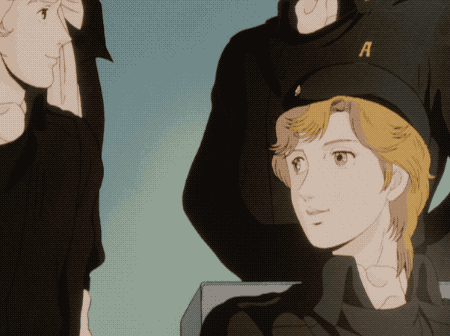
Yes this gif is super cute; no it’s not sufficient evidence of a crush.
(From episode 17.)
Julian is friends with Frederica and likes her. But never (until these two scenes) have we seen his emotions around her seem fraught; we’ve never seen him think about her when she’s not around, or stand in the background of scenes smiling at her. We’ve never even seen them have a conversation in which Julian didn’t bring up Yang.
As I pointed out above, several details about how the dynamic is framed in episodes 30 and 33 reinforce the fact that Yang is in the role of vertex: a) It takes serious mental gymnastics to see Schenkopp’s “Julian will be jealous if you take Frederica to Heinessen and not him” line as trying to imply that Julian has a thing for Frederica. b) In both scenes, Yang is the one whose feelings are unknown, the one who has a potential choice to make. And c) Julian’s none-too-subtle emphasis of the fact that it’s his job right now to cook for Yang makes it even clearer that it’s his role in Yang’s life that’s at issue.
The only reason to think that Frederica rather than Yang is the vertex is an assumption that Julian must be straight. And the only evidence that Julian has a crush on Frederica is the assumption that she must be the vertex of this triangle. This reading falls to pieces as soon as you remove those glasses.
Reading #2: It’s not romantic. This is much more interesting, because unlike Reading #1, it’s not just an illusion created by heteronormative assumptions. It’s a complexity inherent to the actual situation, and incredibly difficult to actually parse out the nuances of, both for us and for Julian.
The show doesn’t bother to give us a lot of details about Julian’s background in season one—we don’t even know at what age Julian went to live with Yang until the beginning of season two—and it’s easy as a viewer to classify Julian early on as “basically Yang’s kid” and therefore assume Julian sees it the same way. But that view bulldozes over a ton of complexity. Julian was raised by his father until he was eight, and went to live with Yang when he was twelve; Yang is his hero, teacher, mentor, role model, idol—all sorts of things, in addition to legal guardian, that create a major power differential between them. But never once does Julian refer to Yang as being like a parent to him as such—if we look at the source material, he’s consistent in referring to himself as Yang’s disciple (弟子) or orderly (従卒), and as I’ve pointed out before, this is reflected in the anime by the fact that his language and bearing around Yang, while affectionate, are more like a subordinate than like close family.
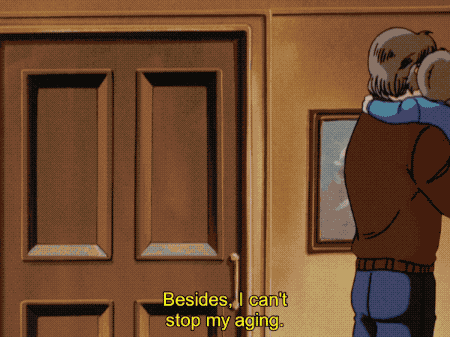
“So far I’ve only lived just shy of fifteen years. Exactly half of Yang’s age. In the next fifteen years, can I catch up to Yang’s pace? [...] ‘Don’t hold back and merely catch up, fly past him,’ Cazellnu said, and Schenkopp teased, ‘You’re running while he’s taking afternoon naps. Surely you’re gaining ground.’ Poplan laughed. [...] All three of them are watching me with interest and possibly some sympathy as I chase after my shifu (a good word, I learned it from Yang) from far behind.”
—Julian’s Iserlohn Diary, p. 136-137
(From episode 29.)
Yang, for his part, has never wanted to be a parent or felt comfortable in that role; and the only way he knows how to treat Julian is as some combination of student and housekeeper.

Okay I’m not actually trying to over-analyze Yang’s syntax here; honestly I’m just taking the opportunity to use this gif because it cracks me up.
(From episode 6.)
All of which is to say that in Julian’s eyes, Yang is an idol rather than a parent; and developing crushes on idols or mentors is so common as to be cliché. There’s nothing inorganic or unrealistic about the idea that Julian’s puppy love could develop into romantic attraction as he grows up. It would be complicated, awkward, painful, confusing, stressful, all sorts of difficult things for him—but none of that makes it unlikely to happen.
Good stories raise more questions than they answer; and the ambiguity and complexity of Julian’s feelings is one of the beautiful things about this story. Is it precisely accurate to call Julian’s feelings romantic? That’s not meant to have an easy answer—especially once you acknowledge that not all romance fits into neat normative boxes, especially once you recognize that romance isn’t synonymous with sex or lust, the lines become fuzzy and difficult to pin down.
But what’s unambiguous is that the question of whether Julian’s feelings are romantic is salient, both to the audience and to Julian himself.

I mean...come on.
The direct segue from Schenkopp commenting on Julian’s jealousy to asking about Yang’s romantic feelings; the paralleling of Yang and Frederica’s potential romance with Julian’s potential future romances; the visual of the target being shot directly in the heart. All of these details suggest that Julian is struggling with the question of how his place in Yang’s life relates to Yang’s love life and to his own. There’s no simple answer, and we’ll be continuing to look for details that give insight into how Julian himself perceives his emotions.

<3
Cazellnu
Meanwhile…
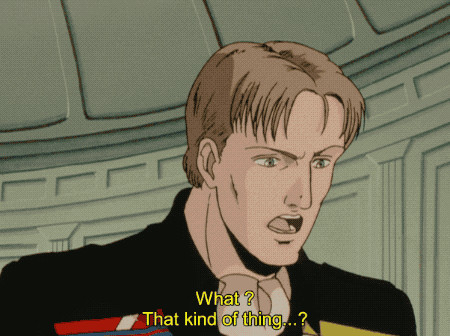
“If you think about it, Cazellnu has no deeds of arms at the front lines or anything. Just through desk work he became a rear admiral at 34, so he’s a real bureaucratic prodigy. [...] When he took university entrance exams, he also passed the exam for the business management program at Ale Heinessen University, but he got the date for the enrollment papers wrong and was left with no choice but the military academy; he says this was one of the major blunders of his lifetime. The other one, he says, is ‘something my wife can never know.’”
—Julian’s Iserlohn Diary, p. 110-111
Okay, so we’re focused on the anime here and technically Tanaka’s writing is not our Official Canon, but this backstory for Cazellnu somehow explains so much. When Yang left for Heinessen he failed to anticipate that Iserlohn would be attacked by an entire fortress (some “Magician” he is...), and left Cazellnu, Bureaucratic Prodigy in temporary command while he was away. Logical enough if the problems that are likely to arise are that somehow not enough toilet paper rations were delivered to block 74 that week; but it’s safe to say that Cazellnu finds himself a bit out of his depth when Geiersberg shows up.
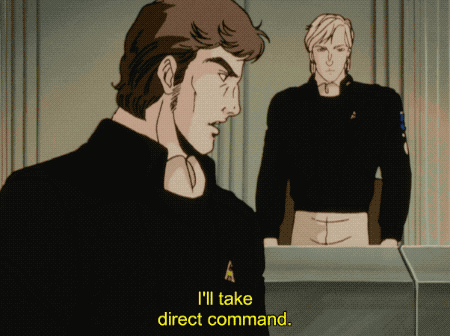
Schenkopp just straight-up disobeys Cazellnu’s order here, chain of command be damned—I like this little reminder that Schenkopp (and by extension the Rosen Ritter) has chosen to be loyal to Yang, but that doesn’t mean that he meekly accepts the authority of the Alliance forces in general.

The other admirals aren’t so brazen, but are also deeply frustrated with Cazellnu’s passive, let’s-just-try-to-stall-until-Yang-saves-us approach to the battle.

Mercifully, for Cazellnu and for the whole fortress, Merkatz has finally had enough of this. This is his extremely dignified and polite way of saying “listen kid, how about you step aside and let someone competent handle this.” Have I mentioned Merkatz is the best?
Poor Cazellnu didn’t ask for this and is really doing his best, and I almost feel bad for him…… but then I remember that he believes the ultimate purpose of human life is to pass on your genes to the next generation and that he ships his eight-year-old daughter with Julian, and I feel less bad.

Yeah that’s right Alex, you brought this on yourself. Shoulda gotten those business school papers in on time, eh?
Stray Tidbits
The liquid hydro-metal coatings of Iserlohn and Geiersberg are one of my two favorite inventions of the anime (the other, of course, being Julian’s cat). This battle is absolutely gorgeous, and I love the Empire’s tactic of using the gravitational pull between the fortresses to submerge the Thor Hammer and expose the back of Iserlohn to attack. Well done anime team, well done.

“In terms of sci-fi concepts, I like the anime-original fluid metal of Iserlohn fortress. Kato Naoyuki (mechanic concept design) didn’t want to just have ships entering and exiting the fortress through an opening, and we started talking about what if they sunk softly into a mercury-like substance, and so it was created. That creation led to the idea of, during the battle with Geiersberg, using the gravitational pull to attack the back side.”
—Producer Masatoshi Tahara, interiew in “LoGH: Complete Guide”
Aha, our first mention of Julian’s height, everyone take a shot! Okay, so tracking Julian’s height down to the half-centimeter (really) is more of a thing in the novels than the anime—in fact I think this is the only time we’re given a specific number in the show, although not the last time the topic arises. Anyway, I share Julian’s “where the fuck did that come from?” reaction here. Is this conversation a product of Yang musing about what Schenkopp said about Julian being jealous? A reasonable interpretation of Schenkopp’s line is that Julian is frustrated at being treated like a kid and left out of the fun grownup adventures. Yang may be obliquely trying to reassure him that he’ll get there soon.
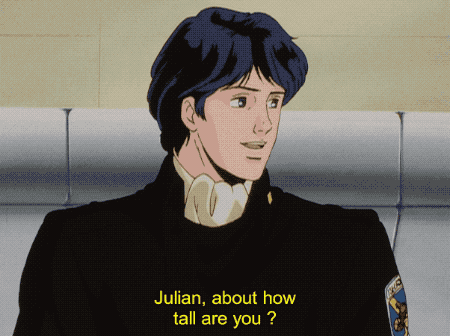
Or maybe that book he’s reading just mentioned something about height and the question was totally random? I honestly don’t know.

In any case, after his initial surprise Julian seems quite pleased that his progress toward adulthood is not going unnoticed. And hi Gensui, yes I see you with that adorable yawn in the background; don't worry, Iserlohn’s design is badass but you are for sure the cutest addition to the anime.
(Both from episode 30.)
I want to read the rest of this story dammit. Does Rose manage to drive the squirrel away?? This is the LoGH fanfiction the public demands.

Schenkopp, I used to respect you, but weak coffee? Have you no dignity at all?
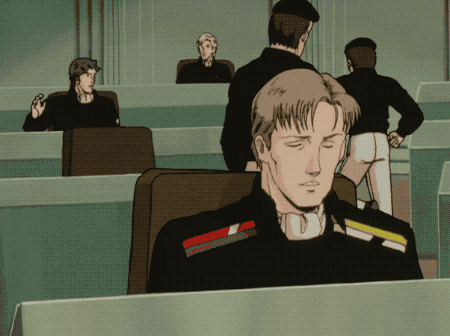
I don’t blame this random kid for seeming so horrified by the request.
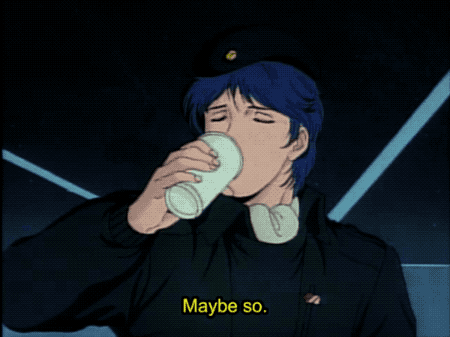
Is it possible that all Alliance coffee is just too weak and that’s why Yang hates it so much?
(From episode 17.)
Julian, we can see you. Didn’t anyone teach you it’s rude to stare?

“Haha, my bad.”
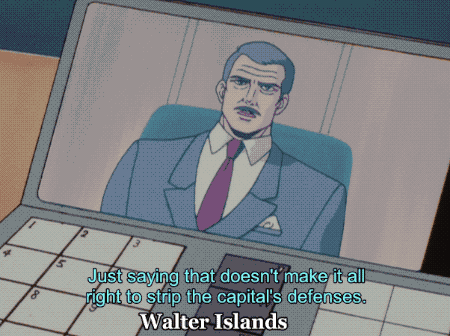
Have I mentioned that I love Iserlohn? Damn it’s gorgeous.

#Legend of Galactic Heroes#Legend of the Galactic Heroes#author: Rebecca#Alliance#Julian#Yang#love triangles#surface readings#Iserlohn#Cazellnu#dammit Cazellnu#seriously though what is your deal#Merkatz#Julian's Iserlohn Diary
25 notes
·
View notes
Text
birthday ficlet, for @reserve
@reserve is my dearest buddy, my singularly amazing partner in crime, my most talented collaborator extraordinare, and today is her birthday!!!!!!!! i love her very much, so i wrote her this dumb benarmie/young kylux ficlet that I hope you also will all enjoy. featuring: classic confused sullen teen ben solo, gratuitous hux descriptions, rae sloane cameo (!!!!!), and the city of coruscant.
it’s pretty long so i’ve put it under a clickthru!
-
up on top (benarmie, 2k, rated teen i guess idk)
Ben sees him first when he is fourteen, while taking two weeks of the Yanvin summer with his mother on Coruscant. It is the third morning: Leia treats him to a breakfast in their rooms (he ruins it by being purposefully sullen and grunting at her questions, squashing delicate star-shaped cuts of fruit into pulp with the tines of his fork and refusing to look her in the eyes), and then sighs and sets off to her meetings, leaving Ben to his own devices.
In the empty suite, he flips through the holonews channels, picks at the mess of fruit drying on his breakfast plate, suns himself on the balcony, jerks off half-guiltily in the sonic, takes a dozy and indulgent nap in the crisp sheets of his bed that leaves his mind pleasantly fuzzy on the edges and seems to momentarily quiet the humming grey flurry of ash in the back of his skull.
He thinks about trying to get his hands on a speeder. (He knows he’s not supposed to wander too far, not supposed to charm his way into trouble, but he also knows that lately everyone around him seems perfectly happy to give him a wide berth, and to tend toward expressions of mild disappointment rather than punishment when things go sour, even Luke.) He thinks about leaving, about just going, to try to find with his own body the impossible edges of the sprawling ecumenopolis. Instead, he dresses, tugs the hood of his robes up over his head and walks aimlessly upwards through the shining halls of Coruscant’s agoras, through its covered markets with shops hawking artfully crinkled silks all in the color of gemstones behind transparisteel arced windows, its gardens with fountains of clear water on the 4000 levels of the Galactic City skyscrapers, catching glimpses of humming skylanes, of hazy shifting clouds, of the remnants of the Federal District repurposed and stripped of insignia.
On level 4500, he catches a hydraulic lift to the top of the new Corusca Tower, the liftpod crammed with cooing tourists with overdone hairstyles, somber men in Senate robes, chittering xenos, droids nattering in binary, all while the holopanels of the pod scroll through supposedly enticing images of the Tower’s restaurants, its shops, its mammoth ovoid crown boasting panoramic views of the very top of the old Fed-Di, the clouds, the sky.
(Maybe, he thinks, in an effort to cheer himself, to ward off the edge of nausea, the encroaching dizziness of too many hours now spent trying to manage the oppressive chatter of millions of other people’s minds, maybe the edge of the city was never sideways, but up. He shoves his hands into his sleeves, ducks his chin under his hood.)
Ben sees him the moment the lift doors open. He’s on the far side of the ovoid, by the curved windows. He’s head-to-toe in dark grey, like a uniform, with a shock of close-shorn bright red-orange hair. The color of it makes Ben think of late season sunsets, atmo-afterburn, Thoraline-gas nebulas, flashes of disgusting, overly dramatic poetic imagery he surprises even himself with. The kid looks about sixteen, seventeen, maybe a little older, skinny in the chest and wrists, with shipbound-pale skin and sharp little eyes the same color as the sweeping aqua of the sky spread out behind him.
He’s in the company of a tall, dark-skinned older woman wearing a vaguely military-inflected outfit. They stand close together, her head turned away as she speaks, and the kid has his attention fixed to the datapad in his hands, typing seriously as if taking notes. Ben fits himself into an alcove by the lift, finding himself suddenly able to ignore the wash of Coruscanti mindchatter, to ignore the dozens of other crowding bodies, to ignore the glittering stupidity of this ancient city trying to disguise its own pain, to ignore his own sullenness and anger—it all drops away as if dropped into a vacuum, all in favor of this strange, straight-backed boy with a hungry, derisive face.
He looks, thinks Ben, like a knife.
He watches as the older woman says something, and the kid nods with finality, tucking his datapad under his arm. The woman touches him lightly on the shoulder, and then takes off purposefully to the other side of the ovoid—Ben tracks her from underneath the shadow of his hood while she is welcomed by a group of people his mother would probably refer to, with a certain dose of light sarcasm, as our friends in the Senate.
The kid settles himself into a low chair by a table, still crowned by the blue of the sky out the window behind him. He crosses his legs at the knee, sits with his spine rigid up against the back of the chair, settles the datapad carefully across his lap—movements to Ben that look so heavily ritualized and controlled that the empty wide space in his chest clenches tight with something like longing, aching for an answer to a question he didn’t know he had buried inside him until now: where did that come from, why is it like that, what do you get from it.
He tugs off his hood, straightens the folds of his robes, and takes a wide arc through the crowd so he comes up on the kid from behind and to his right, as if he’s just been looking for a place to sit, and the chair right here, by the window, next to this stranger, is the first available option. The kid doesn’t look up from his datapad when Ben sits beside him, doesn’t even seem to notice while Ben adopts his most nonchalant slump, one boot resting against the edge of the low table.
From this angle, from close-up, Ben can see the pale blue veins of his wrists peeking out from the grey sleeve-hem, when the kid flips his hand to thumb at the datapad controls. That empty space in Ben’s chest squeezes in on itself again, and he’s speaking before he can even think to stop himself:
“Pretty cool, huh?”
The kid blinks, slowly, and then glances in Ben’s direction. He looks stuck somewhere between surprise and outright disgust at the mere fact of being spoken to.
“Excuse me?”
“I said, ‘pretty cool, huh?’” Ben repeats. He jerks his chin at the curved transparisteel window in front of them, at the glittering spires and expanse of the city tucked into the clouds below them. “The view?”
The kid does that deliberate blink again. (Ben notices that his eyelashes are the same color as his hair, translucent and orange-gold.)
“What?”
“Uh,” says Ben. “You do speak Basic, right?”
“Enough to suggest that you mind your own business.”
The clench in his chest plunges into cold, hard fury. He feels the grin that had been growing on his lips dissolve like it’s been slapped off his face. “Wow.”
“What.”
“You don’t have to be such a jerk, y’know.”
“Don’t I?”
“No,” says Ben.
“My apologies, then.” The kid looks and sounds exactly the opposite of sorry.
“Whatever.” Ben sniffs, and turns his head away, glaring at the plummeting skyline out the window. Even through the unpleasant roiling disappointment, the mean little surge of anger growing in his gut, he can feel the prickle of attention from his left, where the kid is still looking at him. When he glances back, the kid’s expression has softened, almost, his eyes are slightly narrowed, his brows just drawn together: an imperceptible space of fascination opening up inside him—Ben can feel it through the anger like a quiet little tap-tap-tap against his skull.
“What?”
“What is that ridiculous—hairstyle.”
Ben grabs at the end of the braid where it’s resting against his shoulder, reflexive. “Yeah, I know. It’s dumb.” He flicks it behind him, raises his chin. “Won’t have to have it for much longer, though.”
“No?”
“No.” Ben can feel the tapping again. He pushes back against it, just to see what might happen. “You’re uh. Not from around here, are you?”
“Are you?”
“Well, no—but like, you’re really not from here.”
“No,” says the kid. “I’m not.”
“Where from, then?”
The kid drops the edge of the datapad, lets his hands rest against his knees. “You first.”
“Yanvin,” he says, because it’s the simplest answer. “You?”
“You wouldn’t know it,” says the kid.
“I bet I would,” he says.
“I doubt it,” says the kid. He looks away, to the window. “Never mind.”
In profile, he looks very young. There is a smudge of discolored skin where a old bruise must have recently bloomed under his jawline. There is a white-pink scar on his temple, barely a quarter-inch long and very thin. He still, even now, vaguely entranced by the view, holds himself like he has been laced up straight into his own spine. He is obviously terrible at having normal conversations. Where did you come from, thinks Ben, with urgency and delight.
“It is—nice,” says the kid, suddenly. Ben can see his pale eyes tracking the flight of a lux-speeder down below, weaving in-between the pink-lined smog and enviro-filter floaters, the weak sun glinting off the metal plating. “The view.”
“Long way down, right.”
“Yes,” says the kid.
Ben knows that lately, he has been growing all out of proportion. Shot up four inches in the spring and his hands and feet feel often too large for his limbs, he trips and drops things and does his best to pretend that none of it bothers him. But suddenly here alongside this other boy he feels like none of that is true, like it doesn’t matter: he feels strangely strong, oversized like a man, buoyed and powerful, like when the sibilant voice inside his belly and echoing in his skull would sometimes guide his hands during fits of insolence, rage, confusion to make power result where he had only felt helplessness.
“Sort of makes you think about jumping, you know?” When the kid looks back at him, a sudden little spike of confusion on his face, Ben amends: “Not like—not literally. Just. You know.”
“I don’t,” says the kid. Ben knows he’s lying; he can feel it again, the knife-edge going tap-tap-tap inside the bone of his skull.
“Sure,” says Ben. “Not literally, jumping. Just—the urge. To see what would happen.”
“What would happen,” the kid repeats.
“Yeah,” says Ben. “You know. To just do something everybody thinks you can’t handle. Because you want to.”
The kid holds his gaze, his bright eyes narrowed again like he has just realized Ben isn’t just an insolent kid trying to provide a distraction while someone else nicks his credits, like Ben isn’t just a boring, spoiled Coruscanti troglodyte attempting to impress, like Ben isn’t just another blank face filled to the edges with useless white noise—instead like he’s just realized that Ben might be interesting, that Ben might have something to say, and worth listening to.
The kid opens his mouth, as if to reply, at the same time that a woman’s accented voice cuts through the crowd—calling: Armitage?—and then he blinks, his gaze drops, his fingers find their hold on the edge of the datapad again.
“Well,” he says.
“That’s you?”
“That’s me.”
“Armitage,” he says, trying it out.
The kid—Armitage—looks as though he can’t even muster the energy to roll his eyes as he gathers up his things and stands. “We all have names.”
“Right.” Ben grins. “Sorry about yours.”
“I’m sure you are,” says Armitage, pausing with the datapad clutched to his chest as if maybe he is not entirely convinced the conversation is over.
“Want mine?” he asks.
“No,” says Armitage.
“It’s Ben,” he says. “I’m Ben.”
Armitage looks down at him, mouth pursed. Tap-tap-tap goes the radiating little gleam of fascination.
“Ben,” he says, finally. “Well. It’s been very—strange to make your acquaintance.”
“’Bye, Armitage.”
Armitage sneers at him, with all the practiced ease of a polite handshake, and he goes.
–
I know him, he will say to Snoke, only just a few years later, when he has begun to reveal himself and has started to show Ben a new part of his own future. A glimpse of a tall young man with his bright hair tucked under a dark winged cap, standing on the edge of a gleaming black fighter bridge, his hands clasped in a knot behind the small of his back. Eyes the color of the sweeping Coruscant sky narrowed like in his memories, and now full of fire.
I know him, he will say. I’ve met him before.
(He will not say: I’ve thought about him, sometimes. He will not say: I have thought about his mouth, sometimes. About gripping his wrists in my hands and squeezing until the bone shatters. About leaving bruises on his skin.)
Of course you do, Snoke will say. Did you think, my child, that I would not provide for you?
And Snoke will say: Did you think that I would ever let you be so lonely again?
206 notes
·
View notes